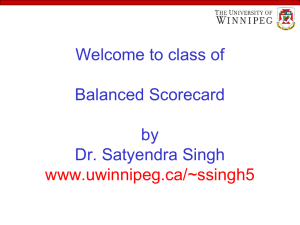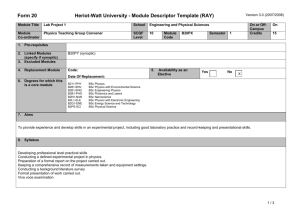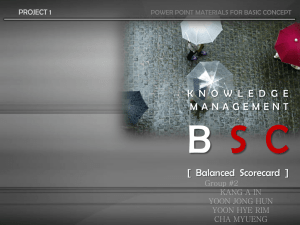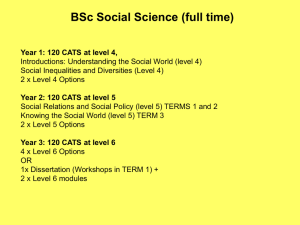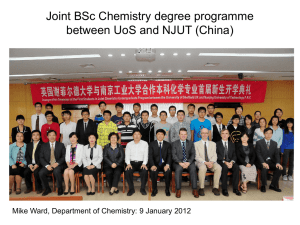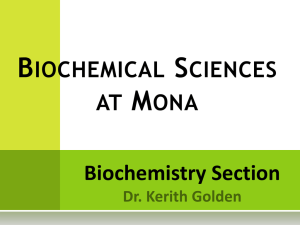BSc(Ed) UCC Frequently Asked Questions
advertisement
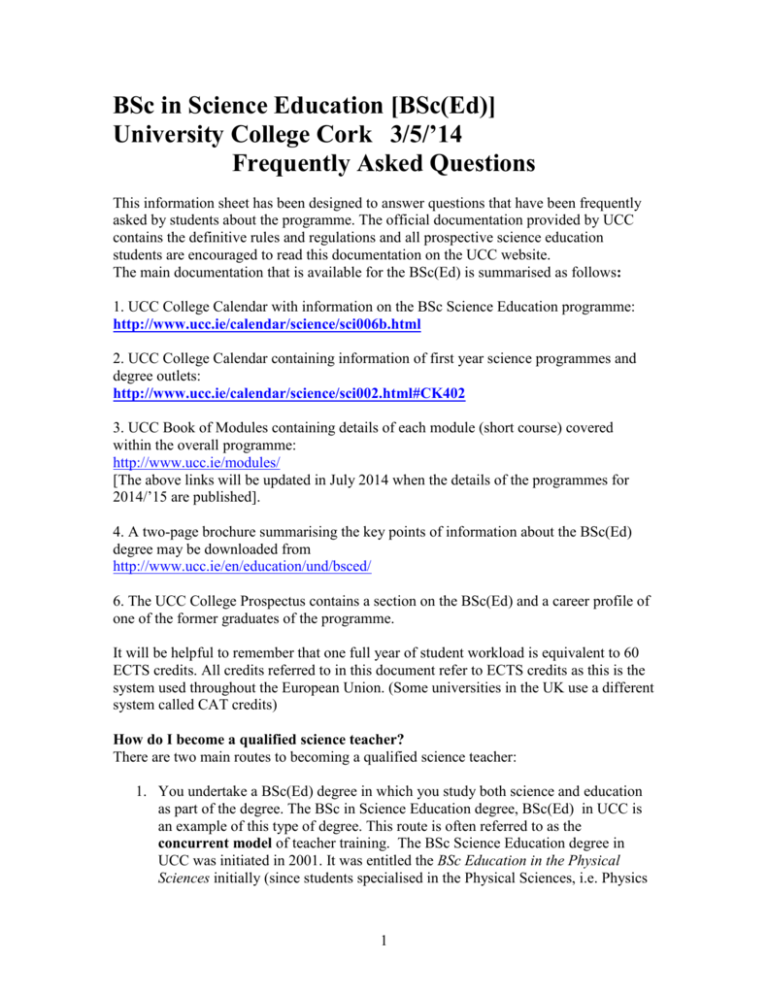
BSc in Science Education [BSc(Ed)] University College Cork 3/5/’14 Frequently Asked Questions This information sheet has been designed to answer questions that have been frequently asked by students about the programme. The official documentation provided by UCC contains the definitive rules and regulations and all prospective science education students are encouraged to read this documentation on the UCC website. The main documentation that is available for the BSc(Ed) is summarised as follows: 1. UCC College Calendar with information on the BSc Science Education programme: http://www.ucc.ie/calendar/science/sci006b.html 2. UCC College Calendar containing information of first year science programmes and degree outlets: http://www.ucc.ie/calendar/science/sci002.html#CK402 3. UCC Book of Modules containing details of each module (short course) covered within the overall programme: http://www.ucc.ie/modules/ [The above links will be updated in July 2014 when the details of the programmes for 2014/’15 are published]. 4. A two-page brochure summarising the key points of information about the BSc(Ed) degree may be downloaded from http://www.ucc.ie/en/education/und/bsced/ 6. The UCC College Prospectus contains a section on the BSc(Ed) and a career profile of one of the former graduates of the programme. It will be helpful to remember that one full year of student workload is equivalent to 60 ECTS credits. All credits referred to in this document refer to ECTS credits as this is the system used throughout the European Union. (Some universities in the UK use a different system called CAT credits) How do I become a qualified science teacher? There are two main routes to becoming a qualified science teacher: 1. You undertake a BSc(Ed) degree in which you study both science and education as part of the degree. The BSc in Science Education degree, BSc(Ed) in UCC is an example of this type of degree. This route is often referred to as the concurrent model of teacher training. The BSc Science Education degree in UCC was initiated in 2001. It was entitled the BSc Education in the Physical Sciences initially (since students specialised in the Physical Sciences, i.e. Physics 1 and Chemistry) but this name was changed to BSc Science Education in 2013 to facilitate the introduction of a biology stream into the programme. 2. You undertake a BSc degree followed by a two-year course called the Professional Master of Education (PME). In former years, the PME course was called the Professional Diploma in Education (PDE) and Higher Diploma in Education (HDE). This route of a BSc degree followed by a teaching qualification is often referred to as the consecutive model of teacher training. How long does it take to become a fully qualified science teacher via the BSc Science Education route? It takes 4 years via the BSc(Ed) route. How long does it take to become a qualified science teacher via the BSc + PME route? It takes 6 years to qualify as a science teacher via the BSc + PME route, i.e. 4 years studying for the BSc degree and two years for the PME. Is the BSc(Ed) degree in UCC recognised by the Teaching Council? Yes, the degree is fully recognised by the Teaching Council. If I graduate with the BSc in Science Education from UCC, will I be a fully qualified science teacher? Yes, you will be a fully qualified science teacher when you graduate with the BSc Science Education degree and you do not have to gain a further qualification in order to be recognised as a qualified science teacher by the Teaching Council. Do I have to undertake the PME (Professional Master of Education) course when the BSc(Ed) is completed? No. Graduates of the BSc(Ed) are fully qualified science teachers and do not need to undertake the PME course. How do I apply for the BSc in Science Education programme in UCC? There are four entry routes into the programme. These are summarised in Table 1. Table 1. Routes into BSc(Ed) degree CAO Code Name CK402 Biological and Chemical Sciences CK404 Biological Earth and Environmental Sciences CK406 Chemical Sciences CK408 Physics and Astrophysics It is only when you have completed your first year at university in one of the above streams that you apply for entry to the BSc Science Education programme. 2 Why is there not a direct CAO entry route into the BSc(Ed) degree in UCC? The programme is specifically designed to give more flexibility to students. In your first year at university you undertake a broad introduction to science and undertake the same introductory course as students studying chemistry, physics, biology and mathematics. You then have a choice at the end of first year as to whether you wish to pursue a BSc degree (i.e. all subjects studied are science subjects) or a BSc(Ed) degree (i.e. the subjects studied are a mixture of science and education). If the BSc(Ed) programme in UCC were designed as a direct entry programme via CAO, you would not have the flexibility described above as you would have already been registered for a degree in science education and have begun the study of education in first year. The model we use in UCC allows you time to settle into college, experience the study of chemistry, physics, biology and mathematics at university level and then decide on your career pathway at the end of first year. In a small number of cases, students who register for the BSc(Ed) in second year discovered when they began teaching practice at the beginning of second year that they were not suited to a career in teaching and then quickly transferred from the BSc(Ed) programme to the BSc programme. This transfer is possible since BSc(Ed) students follow the same programme in first year as the BSc students. What choices do I have to make at the end of first year? When you have completed the first year science programme in UCC, if you decide that you wish to pursue a career in science teaching, you may register for the BSc Science Education degree at the beginning of second year. There are three routes within the BSc(Ed) degree. In Route I you specialise in the study of chemistry, in Route II you specialise in the study of physics and in route III you specialise in the study of biology. The route you are allowed to choose in second year depends on the CAO entry code as shown in Table 2. Table 2. Second year routes available in BScEd degree CAO Code in first year Route available in second year CK402 (Biological and Chemical Route I (Chemistry) or Route III (Biology) Sciences). CK404 (Biological Earth and Route III (Biology) Environmental Sciences). CK406 (Chemical Sciences). Route I (Chemistry) CK408 (Physics and Astrophysics). Route II (Physics) The modules within each route have already been chosen for you and approved by the Teaching Council. Hence, once you register for any one route, the “ready made” package of modules automatically leads to recognition by the Teaching Council. 3 I wish to gain a qualification to teach Leaving Certificate Chemistry and Junior Certificate Science, what CAO route should I choose? You should apply through either CK402 or CK406. I wish to gain a qualification to teach Leaving Certificate Physics and Junior Certificate Science, what CAO route should I choose? You should apply through CK408. I wish to gain a qualification to teach Leaving Certificate Biology and Junior Certificate Science, what CAO route should I choose? You should apply through either CK402 or CK404. What subjects will I be studying in first year? All students study a common core of the subjects chemistry, physics, biology and mathematics in first year. The amount of credits studied in each subject depends on the CAO entry stream, e.g. CK402 students take 15 credits of chemistry whilst CK404 students take 10 credits of chemistry. Full details may be found at: http://www.ucc.ie/calendar/science/sci002.html#CK402 Why does the route available in second year depend on the CAO entry in first year? In order to specialise in one of the routes in second year, you need a good foundation in that specific subject area in first year. For example, students who enter via CK408 (Physics and Astrophysics) undertake 20 ECTS credits of Physics in first year as this is necessary for the detailed study of physics in second year. Students in the other entry streams do not undertake as many credits of physics in first year. What subjects will I be studying in second year, third year and fourth year? Students in Route I (Chemistry) study 30 credits of Chemistry and 30 credits of Education in both second year and third year. Students in Route II (Physics) study 30 credits of Physics and 30 credits of Education in both second year and third year. Students in Route III (Biology) study 30 credits of Biology and 30 credits of Education in both second year and third year. In fourth year, all students study 60 credits of Education. Full details of all modules studied in the programme are given in the UCC College Calendar. http://www.ucc.ie/calendar/science/sci006b.html Do I have to study all three science subjects as part of the BSc Science education programme? Yes you must study chemistry, physics and biology in the BSc Science Education programme in first year. The Teaching Council specifies that you must accumulate a minimum of 10 ECTS credits in biology, 10 ECTS credits in chemistry and 10 ECTS credits in physics in order to be recognised to teach Junior Certificate Science. 4 What subject will I be recognised to teach to Leaving Certificate level by the Teaching Council? You will re recognised to teach the subject in which you have specialised in the BSc(Ed), i.e. students who have followed Route I(Chemistry) will be recognised to teach Chemistry to Leaving Certificate level, students who have followed Route II (Physics) will be recognised to teach Physics to Leaving Certificate level and students who have followed Route III (Biology) will be recognised to teach Biology to Leaving Certificate level. It is important to remember that it is only necessary to have ONE science subject to honours degree level in order to be considered for recognition by the Teaching Council of Ireland. For example, your specialist science subject may be in chemistry. Therefore, your recognition by the Teaching Council will be in that subject, i.e. you will be formally recognised to teach chemistry and Junior Certificate Science However, once you take up a position in a school, you may be asked to teach biology or physics as well as chemistry. This depends on the needs of the particular school. It is possible to be recognised to teach TWO science subjects within a four-year BSc Science Education degree? Under the new regulations published by the Teaching Council in 2011, it is not possible to gain recognition to teach two science subjects within a four-year BSc Science Education degree. Can you give me a detailed explanation as to why it is not possible within a fouryear BSc(Ed) degree to become qualified to teach TWO science subjects to Leaving Certificate level? In the publication Initial Teacher Education: Criteria and Guidelines for Programme Providers (Teaching Council, August 2011), clear guidelines are provided for institutions involved in teacher training. Using the criteria outlined in the above publication, it is clear that it is not possible for a third level institution to award a qualification to a student undertaking a four-year concurrent BSc(Ed) degree to enable that student to be recognised by the Teaching Council to teach two science subjects to Leaving Certificate standard. The reason for this may be understood by reference to page 11 of the above Teaching Council publication. The Teaching Council criteria for the four-year concurrent degree are summarised in Table 3 below. Table 3. Teaching Council specifications for four-year concurrent model of teacher education Subject Foundation School Total Discipline Studies and Placement Professional Studies Time 50% 25% 25% 100% allocation No. of ECTS 120 60 60 240 ECTS credits credits 5 If you study the above table it is clear that the Teaching Council criteria require third level institutions to ensure that student accumulate a total of 120 ECTS credits in the Subject Discipline. According to the Teaching Councils guidelines for Leaving Certificate Science subjects, in order to be recognised to teach Leaving Certificate Physics or Chemistry or Biology, a graduate must have accumulated a minimum of 60 ECTS credits in each specialist subject. In addition, to be recognised to teach the Junior Certificate Science curriculum (consisting of Physics, Chemistry and Biology in equal amounts) a graduate must have accumulated a minimum of 10 ECTS credits in both of the non- specialist science subjects. For example, a graduate recognised to teach Physics, must also accumulate 10 ECTS credits in each of the subjects Biology and Chemistry. These “non-specialist” subjects are usually studied in the first year of a third level BSc(Ed) programme. Thus, subtracting the 60 credits (specialist subject) and the two non-specialist subjects (10 + 10 = 20 credits), from the Teaching Council’s requirement of 120 credits, one is left with only 40 credits of the subject discipline to be allocated. In an age where science teachers have to integrate literacy and numeracy into the teaching of science, it would be unthinkable that a person could qualify as a teacher of science without some study of Mathematics at university, e.g. in UCC all BSc(Ed) students accumulate a minimum of 10 ECTS credits in Mathematics in first year. Hence, the inclusion of a minimum of 10 ECTS credits in Mathematics brings the total number of Subject Discipline credits remaining for allocation down to only 30 credits. This is not sufficient to qualify a teacher to be recognised by the Teaching Council to teach a second subject to Leaving Certificate level. In UCC, these 30 credits are allocated to science subjects at first year level to give the students as good a foundation as possible in order to undertake 30 credits of the specialist subject in second year and 30 credits of the specialist subject in third year. As already explained, the BSc Science Education in UCC consists of three specialist routes (Chemistry or Physics or Biology). Students select one of the routes and each route consists of a minimum of 60 credits in the specialist subject. Hence graduates of the BSc Science Education fulfil all the requirements of the Teaching Council for recognition to teach one of these specialist subjects to Leaving Certificate level as well as recognition to teach Junior Certificate Science. How do I gain a qualification to teach a second science subject to Leaving Certificate level? In UCC it is possible to undertake a two-year part time programme called the Masters in Science Education in which additional modules in physics, chemistry and biology may be undertaken to fulfil shortfalls identified by the Teaching Council. Full details of this programme are available at http://www.ucc.ie/en/education/post/taughtmed/medscience/ In addition, after qualifying with the BSc(Ed) degree you could take additional undergraduate modules as an occasional student in order to satisfy shortfalls identified by the Teaching Council. 6 How do I decide whether I should take the BSc + PME route or the BSc(Ed) route? It is important to realise that at the present time, it is difficult for science graduates to obtain a place on the PME (Professional Master of Education) unless you have a good honours degree. Places on the PME are allocated by the Postgraduate Applications Centre (PAC) and take no account of subjects that are in demand by schools but simply allocate places on the basis of marks. Therefore, you must think carefully at the end of your first year at university about whether you wish to pursue a teaching qualification via the BSc + PME route or the BSc(Ed) route. Discuss your options with the Guidance Counsellor in your school, the Careers Service in UCC or feel free to contact Dr Declan Kennedy, BSc(Ed) programme Coordinator (d.kennedy@ucc.ie). If I qualify as a science teacher via the BSc + PME route would I be qualified to teach two subjects? If one examines the modules studied in each year of a typical honours BSc degree, it is clear that there is a high degree of specialisation in honours BSc degrees. It is not possible to undertake an honours degree in both chemistry and biology or an honours degree in both physics and chemistry or an honours degree in both physics and biology. Honours BSc degrees are specialist degrees in either chemistry or physics or biology. How does the Teaching Practice Placement component of the BSc(Ed) programme operate? The Education modules in the BSc(Ed) may be summarised as follows: Second year ED2101 Science Education I (15 credits) ED2102 Teaching Practice Placement Science Education I (15 credits) Third Year ED3101 Science Education II (15 credits) ED3102 Teaching Practice Placement Science Education II (15 credits) Note that in second year and third year you participate in Teaching Practice Placement where you gain experience of science teaching. This takes place in local secondary school over a 10 week period and involves direct teaching of 3 hours per week + 1 hour of mentoring. During this time you will receive two visits from your Teaching Practice supervisor. Teaching practice is fitted in around UCC lectures and lab practical work. Fourth Year In fourth year, all modules are Education modules. Full details of these modules are given in the UCC College Calendar. In fourth year, the school placement module (ED4102) involves you teaching during morning periods over the entire school year in local schools for 6 class periods per week (100 hours over the year) plus involvement in various associated activities in school. You will receive five supervised visits from your Teaching Practice supervisors during this time. 7 Is the BSc(Ed) a route to qualification as a teacher of Mathematics? No. To become a qualified teacher of Mathematics you must have studied mathematics to degree level. How is the BSc(Ed) course assessed? The course is assessed by means of terminal written examinations and continuous assessment. All Education modules are examined by means of continuous assessment. Details of the assessment of each individuals module are given on the UCC website http://www.ucc.ie/modules/ Is it possible to join the BSc(Ed) programme in third year? Applicants who hold a degree (at least NFQ Level 7 with Merit 1 or Distinction) in Physics or Chemistry or Biology which satisfies the requirements of the Teaching Council for recognition to teach the subject to the highest level in secondary school or an equivalent qualification may enter this programme in Third Year and take ED2101, ED2102, ED3101 and ED3102 in Third Year before proceeding to Fourth Year. Students who enter the programme via this route must pass ED2101, ED2102, ED3101 and ED3102 before proceeding to Fourth Year. Applications must be submitted to Sandra O’Herlihy (S.OHerlihy@ucc.ie ) Undergraduate Admissions Office, West Wing, UCC. All applications must be accompanied with written certification from the Teaching Council indicating that the degree held by the applicant satisfies the requirements of the Teaching Council for recognition to teach that subject. Once your application is officially appoved, set up on the students database and the fee paid, you will be registered in August prior to the commencement of the programme. If you have any queries about this entry route, please contact the Programme Coordinator (d.kennedy@ucc.ie). In 2014/’15 the fee for the direct entry route for year 3 is €5400 and year 4 is €5400. I would like to speak to some former graduates of the BSc(ED), is this possible? Since the programme has been running since 2001, there are many former graduates teaching in local schools. If you wish to speak to any of these former graduates of the programme, please contact the Programme Co-ordinator (contact details below) and he will be happy to put you in touch with some of these graduates. If you have any questions which are not answered in this information sheet, please contact: Dr Declan Kennedy, Programme Coordinator, School of Education, UCC. E-mail: d.kennedy@ucc.ie Tel: (021) 4903469 8
